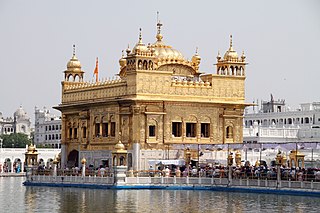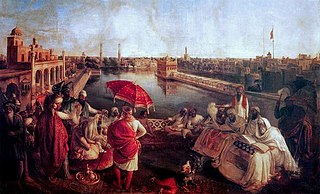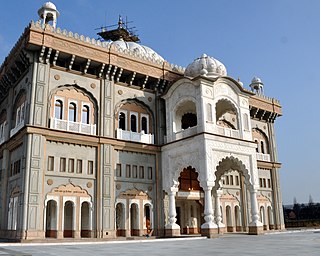
Sikhism, also known as Sikhi, is an Indian religion and philosophy in particular for the Sikh ethnoreligious group that originated in the Punjab region of India around the end of the 15th century CE. The Sikh scriptures are written in the Gurumukhi script particular to Sikhs. It is one of the most recently founded major religious groups and among the largest in the world, with about 25–30 million adherents.

Sikhs are an ethnoreligious group and Indo-European people who adhere to Sikhism, a religion that originated in the late 15th century in the Punjab region of the Indian subcontinent, based on the revelation of Guru Nanak. The term Sikh has its origin in the Sanskrit word śiṣya, meaning 'seeker', 'disciple' or 'student'. According to Article I of Chapter 1 of the Sikh Rehat Maryada, the definition of Sikh is: Any human being who faithfully believes in
- One Immortal Being
- Ten Gurus, from Guru Nanak Sahib to Guru Gobind Singh Sahib
- The Guru Granth Sahib
- The utterances and teachings of the ten Gurus and
- The initiation, known as the Amrit Sanchar, bequeathed by the tenth Guru and who does not owe allegiance to any other religion, is a Sikh.

Nankana Sahib is a city and capital of Nankana Sahib District in the Punjab province of Pakistan. It is named after the first Guru of the Sikhs, Guru Nanak, who was born in the city and first began preaching here. Nankana Sahib is among the most important religious sites for the Sikh religion. It is located about 91 km (57 mi) west of Lahore and about 75 km (47 mi) east of Faisalabad. According to the census of 2017 the city has a population of 110,135 inhabitants. Until 2005, it was a part of the Sheikhupura District.

A gurdwara or gurudwara is a place of assembly and worship for Sikhs but its normal meaning is place of guru or "Home of guru". Sikhs also refer to gurdwaras as Gurdwara Sahib. People from all faiths and religions are welcomed in gurdwaras. Each gurdwara has a Darbar Sahib where the Guru Granth Sahib is placed on a takht in a prominent central position. Any congregant may recite, sing, and explain the verses from the Guru Granth Sahib, in the presence of the rest of the congregation.
The following outline is provides an overview of Sikhism, or Sikhi.

The history of the Jews in Scotland goes back to at least the 17th century. It is not known when Jews first arrived in Scotland, with the earliest concrete historical references to a Jewish presence in Scotland being from the late 17th century. Most Scottish Jews today are of Ashkenazi background who mainly settled in Edinburgh, then in Glasgow in the mid-19th century. In 2013 the Edinburgh Jewish Studies Network curated an online exhibition based on archival holdings and maps in the National Library of Scotland exploring the influence of the community on the city.

Islam in Scotland includes all aspects of the Islamic faith in Scotland. The first Muslim known to have been in Scotland was a medical student who studied at the University of Edinburgh from 1858 to 1859. The production of goods and Glasgow's busy port meant that many lascars were employed there. Most Muslims in Scotland are members of families that immigrated in the later decades of the 20th century. At the 2011 census, Muslims comprised 1.4 per cent of Scotland's population (76,737). In the 2022 census, this grew to 2.2% of the population (119,872).
Ravidassia or the Ravidas Panth is a religion based on the teachings of Guru Ravidas. It was considered a sect within Sikhism until 2009. However, some Ravidassias continue to maintain Sikh religious practices, including the reverence of the Guru Granth Sahib as their focal religious text, wearing Sikh articles of faith (5Ks), and appending Singh or Kaur to their names.

British Sikhs number over 520,000 people and account for 0.85% of the British population as of 2021, forming the United Kingdom's fourth-largest religious group. According to the 2021 United Kingdom census, British Sikhs numbered 524,529, with 520,092 in England, 4,048 in Wales, and 389 in Northern Ireland. The largest Sikh populations in the United Kingdom are in the West Midlands and Greater London.
Sikhism is a minority religion in Belgium, but Sikhs have played a role in Belgian history; during World War I, many Sikhs fought in Belgium. In the First Battle of Ypres, an entire platoon of Dogra Sikhs died.
The Ramdasia were historically a Sikh, Hindu sub-group that originated from the caste of leather tanners and shoemakers known as Chamar.

The Delhi Sikh Gurdwara Management Committee (DSGMC) is organization in India responsible for the management of Gurdwaras, Sikh places of worship in Delhi. It also manages various educational institutions, hospitals, old age homes, libraries and other charitable institutions in Delhi. It is headquartered in Gurdwara Rakab Ganj Sahib, near Parliament House. Currently, the president of DSGMC is Harmeet Singh Kalka.

German Sikhs are a growing religious minority in Germany. The majority of German Sikhs have their roots from the Punjab, India with the remaining coming from the Afghan Sikh community or through conversion. The number of Sikhs is estimated to be between 25,000. Germany had the fifth highest Sikh population in Europe after United Kingdom (524,000), Italy (220,000), Portugal (35,000) and Spain (26,000).

English Sikhs number over 520,000 people and account for 0.9% of England's population in 2021, forming the country's fourth-largest religious group. In 2006 there were 352 gurdwaras in England. The largest Sikh populations in the U.K. are in the West Midlands and Greater London.
Followers of Sikhism do not have a preference for meat or vegetarian consumption. There are two views on initiated or "Amritdhari Sikhs" and meat consumption. "Amritdhari" Sikhs can eat meat. "Amritdharis" that belong to some Sikh sects are vehemently against the consumption of meat and eggs.
Scottish Asian is a term defined within the 2011 Scottish census as including people of Bangladeshi, Chinese, Indian, Pakistani or other Asian ancestry resident in Scotland. Their parents or grandparents are normally Asian immigrants. It can also refer to people who are of dual Scottish and Asian ancestry. It combines Asian ethnic background with Scottish national identity.

The Singh Sabhā Movement, also known as the Singh Sabhā Lehar, was a Sikh movement that began in Punjab in the 1870s in reaction to the proselytising activities of Christians, Hindu reform movements and Muslims. The movement was founded in an era when the Sikh Empire had been dissolved and annexed by the British, the Khalsa had lost its prestige, and mainstream Sikhs were rapidly converting to other religions. The movement's aims were to "propagate the true Sikh religion and restore Sikhism to its pristine glory; to write and distribute historical and religious books of Sikhs; and to propagate Gurmukhi Punjabi through magazines and media." The movement sought to reform Sikhism and bring back into the Sikh fold the apostates who had converted to other religions; as well as to interest the influential British officials in furthering the Sikh community. At the time of its founding, the Singh Sabha policy was to avoid criticism of other religions and political matters.

Sikhism prohibits idolatry, in accordance with mainstream Khalsa norms and the teachings of the Sikh Gurus, a position that has been accepted as orthodox.













